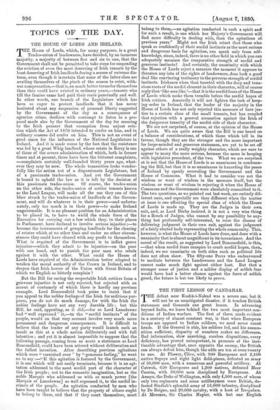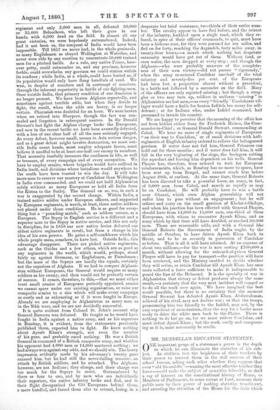THE FIRST LESSON OF CANDAHAR. T HE defeat near Kushk-i-Nakud was
a severe one, but it will not be an unmitigated disaster, if it teaches British statesmen and Generals one great lesson. In advancing beyond India, we leave behind the two most important con- ditions of Indian warfare. The first of these, made evident in a century of almost constant war, is that when European troops are opposed to Indian soldiers, we need never count heads. If the General is able, his soldiers fed, and his ammu- nition sufficient, disparity of numbers makes no difference. Bad information, slow marching, careless dispositions, every deficiency, has proved unimportant, in presence of the ines- timable advantage that, once opposite the enemy, the British can always defeat him, though the odds are ten or even twenty to one. At Plessey, Clive, with 900 Europeans and 2,100 native Sepoys and eight light field-pieces, defeated an army of 50,000 men, with a numerous and powerful artillery. At Cutwah, 650 Europeans and 1,200 natives, defeated Meer Cassim, with 30,000 men disciplined by Europeans. At Assaye, the Duke of Wellington, with only 4,500 men, of whom only two regiments and some artillerymen were British, de- feated Sindiah's splendid army of 16,000 infantry, disciplined by De Boigne, and 20,000 cavalry, with a host of Irregulars. At Meeanee, Sir Charles Napier, with but one English
regiment and only 2,000 men in all, defeated 30,000 or 35,000 Beloochees, who left their guns in our hands, with 6,000 dead on the field. In almost all our great victories, we were hopelessly outnumbered. Indeed, had it not been so, the conquest of India would have been impossible. Till 1857 we never had, in the whole peninsula, as many Englishmen as obeyed Wellington at Waterloo, and never were able by any exertion to concentrate 50,000 trained men for a pitched battle. As a rule, any native Prince, how- ever petty, could outnumber us, and any province, however feeble, could overwhelm any garrison we could station within its confines ; while India, as a whole, could have buried us, if its population would only have flung handfuls of sand. We won, in despite of numbers and in contempt of numbers, through the inherent superiority in battle of our fighting-men. Once outside India, that primary condition of our dominion is no longer present. We have beaten Afghans repeatedly, and sometimes against terrible odds, but when they decide to fight, the result, when the odds are heavy, is no longer certain. Charasiab was doubtful for an hour. We were beaten when we retired into Sherpore, though the fact was con- cealed and forgotten in subsequent success. In Sir Donald Stewart's last fight the Afghan charge broke the Europeans, and now in the recent battle we have been avowedly defeated, with a loss of one clear half of all the men seriously engaged. As every defeat, however small, means in Asia serious danger, and as a great defeat might involve destruction, we must out- side India count heads, must employ adequate forces, must believe it needful to be at least one-half our enemy in numbers. That necessity fearfully increases the costliness in life, as well as treasure, of every campaign and of every occupation. We have to employ armies, where brigades would have sufficed in India itself, and divisions where battalions would anywhere to the south have been trusted to win the day. It will take more men to recover our mastery at Candahar than Wellington in India ever commanded, and we could not hold Afghanistan safely without as many Europeans as hold all India from the Kistna to the Sutlej. The demand on us, too, in such a war is exaggerated by the second change. Within India, a trained native soldier under European officers, and supported by European regiments, is worth, at least, three native soldiers not placed under those conditions. He is as good for every- thing but a " pounding match," such as seldom occurs, as a European. The Sepoy in English service is a different and a superior man to the Sepoy in native service, and this not only in discipline, for in 1858 our new native levies defeated our oldest native regiments in revolt, but from a change in his idea of his own powers. He gains a self-confidence which his whole people seem, somehow, to have lost. Outside India, this advantage disappears. There are picked native regiments, such as the Guides and a few others, which are as good as any regiments in the world, which would, perhaps, stand fairly up against Germans, or Englishmen, or Frenchmen ; but the mass of the Sepoys are hardly the equals, certainly not the superiors of Afghans. If we had to conquer Afghani- stan without Europeans, the General would require as many soldiers as his enemy, and then would not be perfectly certain of success. It comes, therefore, to this,—that we must either trust small armies of Europeans perfectly appointed, armies we cannot spare under our existing organisation, or raise our composite armies to a size which will make every campaign as costly and as exhausting as if it were fought in Europe. Already we are employing in Afghanistan as many men as in the Sikh wars, and we are not decidedly successful.
It is quite evident from Colonel St. John's account why General Burrows was defeated. He fought as he would have fought in India against a native army, and as his superiors in Bombay, it is evident, from the statements previously published there, expected him to fight. He knew nothing about Ayoub Khan's strength, not even the number of his guns, and probably cared nothing. He was a British General in command of a British composite army, and whether his opponent had 4,000 men or 14,000 mattered nothing ; we had always won against any odds, and we should win. The heavy impression evidently made by his adversary's twenty guns amazed him, but he bad still the never-failing resource, an attack by British soldiers, and he attacked. The Afghans, however, are not Indians ; they charge, and their charge was too much for the Sepoys to resist. Outnumbered by three or four to one, and by men who are individually their superiors, the native infantry broke and fled, and in their flight disorganised the 650 Europeans behind them, a mere handful, and forced them also to retreat, losing, in a desperate but brief resistance, two-thirds of their entire num- ber. The cavalry appear to have fled before, and the retreat of the infantry, huddled upon a single road, which they re- fused, in spite of their officers' commands, to quit, must have been a hideous rout, for they were pursued for ten miles, and fled on for forty, reaching the Argandeb, forty miles away, in twenty-four hours,—a march which nothing but desperate extremity would have got out of them. Without food, or even water, the men dropped at every step ; and though the Afghans—who were probably unaware of the complete- ness of their own victory—did not pursue " vigorously," when the army re-entered Candahar one-half of the total infantry and seventy-five per cent. of the Europeans had been lost, a proportion almost without a precedent, in a battle not followed by a surrender on the field. Many of the officers are only reported missing ; but though a strag- gler or two may turn up, soldiers in uniform missing " in Afghanistan are lost men,—as every "friendly" Candaharee vil- lager would have a knife for beaten Infidels too weary for self- defence ; or for Indians who, under Infidel command, had presumed to invade his country.
We are happy to perceive that the meaning of the affair has not been hidden either from Sir Frederick Haines, the Com- mander-in-Chief ; or General Donald Stewart, commanding at Cabul. We hear no more of single regiments of Europeans "on their way to Candahar," or of small divisions with half- regiments of English infantry ordered to relieve the beleaguered garrison. If water does not fail him, General Primrose can hold out for three months ; and if water does fail him, it will fail in the very beginning of the siege, the besiegers cutting the aqueduct and leaving him dependent on his wells. General Phayre has, therefore, been ordered to wait for European reinforcements, which, as Bombay has no more to spare, have been sent up from Bengal, and cannot reach him before August 20th, at earliest. At the same time, General Roberts has been directed to take a powerful force, an army, in fact, of 9,000 men from Cabul, and march as rapidly as may be on Candahar. He will probably have to win a battle near Ghuzni, which even Afghan generalship will not suffer him to pass without an engagement ; but he will relieve and carry on the small garrison of Khelat-i-Ghilzye, and when his junction has been effected with General Phayre, should have from 14,000 to 15,000 men, one-third of them Europeans, with whom to encounter Ayoub Khan, and an army which by that time will have doubled, or reached 30,000 men. Those are reasonable odds, and with a General like General Roberts the Government of India ought, by the middle of October, to have driven Ayoub Khan back to Herat, and to be as securely in possession of Candahar as before. That is all it will have attained. At an expense of about two millions,—for the war is now costing £700,000 a month, without allowing for the unheard-of-prices General Phayre will have to pay for transport—the position will have been retrieved, and the Ministry enabled to decide whether they will retire, or retain Candahar till Ayoub Khan has once more collected a force sufficient to make it indispensable to guard the line of the Helmund. It is the specialty of war in Afghanistan that victory or defeat produces always the same result,—a certainty that the very next incident will compel us to do all the work over again. We have imagined the best result possible, but there is no certainty that the moment General Stewart has defeated Ayoub Khan, Abdurrahman, relieved of his rival, may not declare war ; or that the troops, pronouncing him too friendly to the Infidel, may not, by the easy expedient of assassination, clear the way for a leader more ready to drive the white men back to the Plains. There is nothing to do but go on, for we must relieve Candahar, and must defeat Ayoub Khan ; but the work, costly and exasperat- ing as it is, must necessarily be sterile.



































 Previous page
Previous page